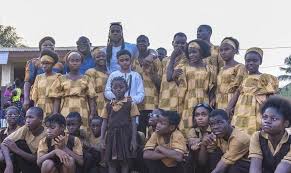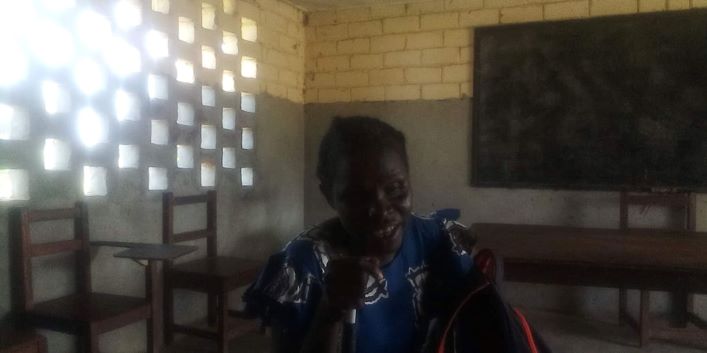PHOTO: Teacher Grace L. Johnson
By Tina Mehnpaine, Internews PwD Reporting Fellow
Grace L. Johnson, a visually impaired teacher at Liberia Christian Association of the Blind (CAB) Rehabilitation Community is one of those helping to drive the literacy rate up for students with visual impairment.
She says helping visually impaired children to read braille “is what I have passion to do”.
Braille is a defined as system of raised dots that can be read with the fingers by people who are blind or who have low vision. Teachers, parents, and others who are not, says American Foundation for the Blind.
Braille is a code used by people who are blind or visually impaired to read and write.
Teacher Johnson says one must have a passion to teach visually impaired students so as to enable them to feel a part of society.
Working at the Liberia Christian Association of the Blind for the past eight years has enabled Madam Johnson to help numerous pupils complete their basic/beginning education successfully.

Some visually impaired students from CAB
Although the Ministry of Education several years ago established an Inclusive Education Division policy, implementation remains a major challenge, posing hurdles for the People with Disabilities.
The policy was set up to ensure that people living with disabilities (PWDs) have access to supportive and responsive education.
Besides, it supposed to be helping physically challenged children with their learning needs and talents in a participatory and non-discriminatory manner.
The division supervises the training and monitoring of physically challenged teachers, though Liberia depends practically on donors and international partners’ support. Much is yet to be done to increase access to education for PWDs across the country.
As much as the physically challenged community who represent fourteen percent of the country’s population. Yet, according to the 2008 Housing and Population Census, they continue to be marginalized.
However, there are still some who have remained persistent and adopted an independent posture, not relegating themselves to street begging.
Teacher Grace Johnson believes that if policymakers and government can come up with programs and give more support to the inclusive education division, it will one day able to make an impact in society.
“We have a lot of good students here who are smart and very clever and are committed to forwarding their education,” Madam Johnson notes.
“I am the only active female virtually impaired teacher helping the kids to recite with the braille,” she told this Reporter in a recent interview.
Using the Braille literacy system, visually impaired persons can read the text of any kind using fingers rather than eyes.
“It was unfortunate for us that one of our staff died so the school sent my name to MOE (Ministry of Education) and up to present, my name has not been placed on government’s payroll (meaning she’s not getting government salary),” Teacher Johnson says.
There is a school in the Vai Town community on the Bushrod Island where she teaches. And she says she spends LD$3,000.00 every month on public transport to commute from her residence on the Monrovia-Robertsfield highway daily to ensure that the students learn.
“Being a teacher of a blind person requires a deeper commitment because he or she has to address both the pupil’s educational and emotional needs. As a teacher, one should have love and compassion for the blind pupil,” says Teacher Johnson.
According to her, students with visual impairment need a deep sense of commitment because they have to address both their students’ educational and emotional needs.
A graduate of the Lormadia High in Gardnerville, Teacher Johnson says she returned to the Christian Association of the Blind to continue her passion for teaching.
“Currently, I am the only active female visually impaired teacher helping the children to recite with the braille,” she says.
“One of the sensual inputs I had was teaching pupils how to properly read the braille,” she notes.
“We have a lot of good students here who are smart and very clever and are committed to forwarding their education,” Teacher Johnson explains. Publication of this article was made possible with support from Internews Liberia Inclusive Media Project.

